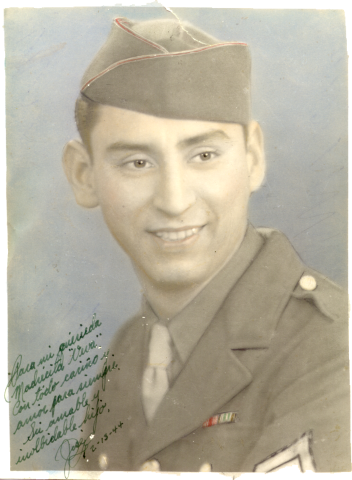
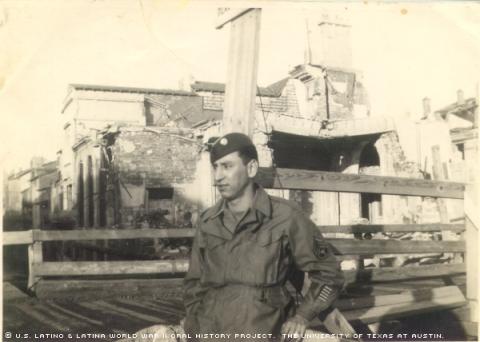
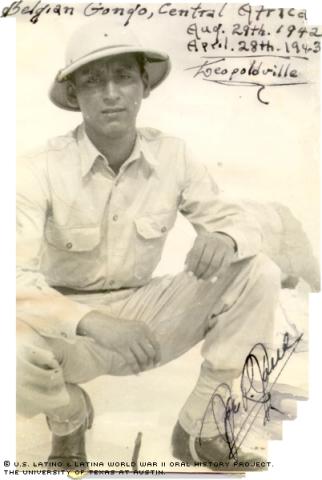
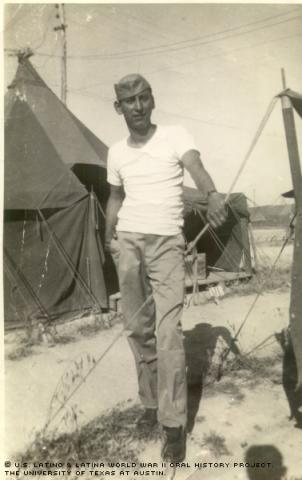
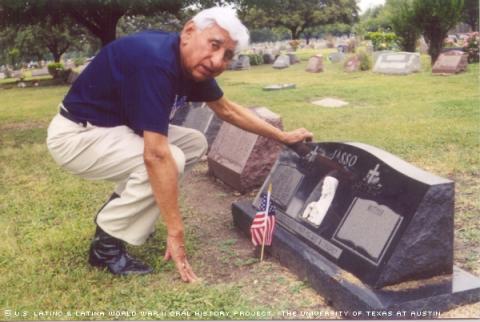
By Tony Cantú
Among his siblings, four of whom would join him in the war effort, Jose Ramirez "Joe" Jasso is remembered as el cabezudo, the hard-headed one of the bunch, always getting into trouble as a youth.
Jasso had grown up quickly by the time he joined the war effort. Serving as a surgical technician, he helped treat victims of the Bataan Death March in the Philippines and the Corregidor battle. Amid the wounded and dying, the playfulness and mischief of childhood quickly became a thing of the past.
Jasso’s war-time contributions almost didn't come to pass, as he was initially declared ineligible for service because of a perforated eardrum after trying to volunteer for the Army Air Corps. Called to makeshift Army offices at the old Tower Life Building in downtown San Antonio, he expected to be turned down again. But instead, was drafted into the Army.
He remembers calling his father with the news. But before he could speak, the concerned parent gently scolded his notoriously misbehaving son.
"Ay, m'ijo, que hiciste mal ahora?" ("Son, what have you done wrong this time?") Jasso remembered being asked.
"No, 'apa, me voy a la guerra," he responded. "No hice nada mal, 'apa!" ("No, father, I am going to war. I have not done anything bad, father!")
Jasso’s proud papa responded with his blessing, an abrazo and $2 before saying goodbye to his son.
Born in El Campo, Texas, on Oct. 5, 1916, Jasso was no stranger to hardship and tragedy. His Mexican-born parents, Antonio Jasso and Genoveva Ramirez Jasso, went to South Texas to become crop pickers, only to see two of their four children die in infancy under poverty-ridden conditions. A third child, this time a girl, would also later die before her first year, leaving the couple with eight surviving children. Jasso had a hard time in school, flunking first grade twice and ultimately dropping out of high school.
In 1943, the father who’d been so proud of his boy passed away suddenly at the age of 56. When he got the news, Jasso had just reached Leopoldville, Belgian Congo, in Equatorial Africa after 33 days on a ship.
"It was during my year of duty in Leopoldville that I received notice of my father's passing, two months after his death," Jasso recalled.
Before that sorrow, he’d been fueled with patriotism as he embarked for Fort Bliss, Texas, to be inducted. The sense of duty ran deep in the Jasso family. He remembers the anguish felt by his eldest brother after being turned down by the military because of his status as a 35-year-old father of five, the sibling crying aloud at not being able to join his brothers in war. Jesus "Jesse" Jasso instead accompanied his father, transporting his servicemen siblings to the train station on the first leg of their overseas journeys.
At Fort Bliss, Jasso passed a qualifying exam as a medic and was assigned to the Medical Recruit Training Center in Camp Barkeley near Abilene, Texas. At William Beaumont General Hospital in El Paso, Texas, he received training and passed another exam qualifying him as a surgical technician. There, he treated the injured from Bataan and Corregidor, many of them malnourished and dehydrated, others suffering from serious wounds to the abdomen and chest.
"I gave enemas, took vital signs, administered injections for pain and changed dressings to their wounds," Jasso recalled. "One of the first patients that I had was a colonel who had been hit in the head with rifles and what have you. He had to be operated to try to alleviate pressure in the brain. That was the first time that I came into contact with a [Bataan] casualty.”
Jasso still has the program listing him as a graduate of the surgical technician class at William Beaumont Hospital. He sent it to his family from overseas, writing instructions on the back for it to be framed and to take the place of a high school graduation diploma he never received.
He later reported to Fort Bragg, N.C., en route to North Africa, joining some 1,500 soldiers aboard The James Parker, a luxury liner converted to a troop ship. His year of duty at Leopoldville involved work as a surgical technician in an operating room at a convent hospital.
He remembers the unbearable heat -- with temperatures rising above 100 degrees -- as he was airlifted to Casablanca in French Morocco across a portion of the Sahara Desert in 1942. In Morocco, he served with his hospital unit in Port Lyautey, later serving in Marseilles and Epinal, France.
During a Paris furlough, Jasso was summoned to the South Pacific Theater of Operations. But before being shipped off from Epinal, the war ended with Japan's surrender. After the war, he was transferred to the 21st general hospital and helped with evacuation efforts in France and Germany as well as monitored for signs of communicable disease.
He earned the EAME Campaign Medal with one Bronze Star, a Good Conduct Medal and a World War II Victory Medal.
Returning to San Antonio, he worked at Brooke Army Medical Center from 1946 to1952 as an operating-room technician before losing the job to a master sergeant who outranked him. So in 1952, he returned to Kelly Air Force Base -- having worked there before the war when it was known as Duncan Field -- where he'd spend 35 years first as a warehouseman and then as a supply inspector.
Jasso served as a union steward and vice president to the American Federation of Government Employees, and as a board member of both the Legal Aid Association and the Barrio Betterment Development Corp., the latter for whom he would serve as president.
In 1956, he joined the Texas Air National Guard 182nd Fighter Squadron as a medic. When the unit moved to Kelly Air Force Base, he became an aero-medical technician with the 149th Tactical Unit, from which he retired at Technical Sergeant after 20 years of service.
He still lives in the San Antonio, Texas, home he bought with his G.I. benefits, with his wife of 54 years, Maria Antonieta Ynman, with whom he had five children.
Mr. Jasso was interviewed in San Antonio, Texas, on June 18, 2001, by Evelyn Jasso Garcia.

